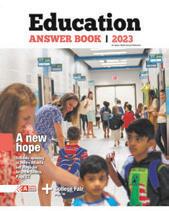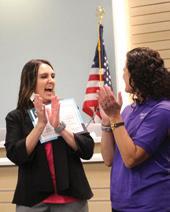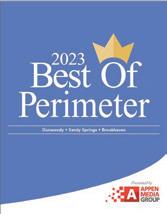




Dr. Brent Taylor is a Board-Certified Dermatologist, a Fellowship-Trained Mohs Surgeon, and is certified by the Board of Venous and Lymphatic Medicine in the field of Vein Care.
He is an expert in skin cancer and melanoma treatment, endovenous laser ablation, minimally invasive vein procedures and cosmetics procedures such as Botox and injectables.
Kathryn is a certified physician assistant with over 22 years experience as a Dermatology PA and cosmetic dermatology.
Her specialties include general dermatology such as acne, eczema, rashes, hair loss, full body skin exams, abnormal growths etc. Kathryn also specializes in cosmetic dermatology including lasers, injectables, micro-needling, PRP, facial peels, sclerotherapy for spider veins and at home skin care.
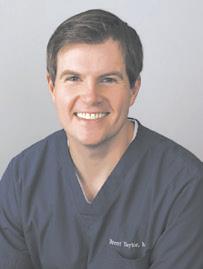
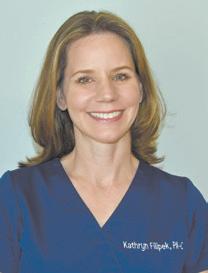

How being a bad golfer can be hazardous to your health
Brought to you by – Premier Dermatology
I recently had a conversation with a patient about tick-borne illnesses, and our discussion reminded me of an interesting study that I Iearned about in medical school – a tale that ended with the warning “don’t go into the rough.” If you haven’t heard of it, ehrlichiosisis is one of numerous diseases that ticks carry and that humans can catch when ticks bite them, but this disease was not always so well known.
The year is 1993, and four men who lived in a golf-oriented retirement community in Tennessee were hospitalized with fever, headache, vomiting and abdominal pain. Blood tests revealed abnormally low white blood cell counts, low platelets, as well as inflammation of the liver. Two of these men ended up in the intensive care unit. An astute physician ordered a test for ehrlichiosis, and all four men tested positive for this illness.
This outbreak prompted the physician to assign several residents and medical students (aka “underlings”) to tramp through the woods and go door to door in this golf community gathering information about other people who might be infected. People were asked for blood samples and patients admitted to the local hospital with fever of unknown origin also had their blood tested. An “environmental survey” was conducted of local animals to identify ticks and the diseases that they carried.
As the results came in, a picture began to emerge. Most of the patients were golfers. There was a trend towards higher rates of infection in people who golfed more often. But, compellingly, it was only the bad golfers – those who averaged high scores –who seemed to be getting infected.
What could be causing the bad golfers to be infected while the good golfers remained healthy? Were their immune systems, like their golf swings, simply superior to those of the bad golfers? Is charisma a factor?
No, it turned out that the single factor that was most strongly associated with ehrlichiosis infection was retrieving a golf ball that was hit off the golf course instead of using a new ball. And bad golfers hit the golf ball in the rough or in the woods more often than the good golfers. In fact, golfers who retrieved their balls from the woods were 270% more likely to be infected than those who simply used a new ball. The case was cracked, and the lesson was clear – don’t go into the rough. Or, if you do, use a lot of insect repellant.
This tick season, remember to protect yourself. If you know a golfer, warn him or her about ehrlichiosis. And if you or a loved one has a spot worrisome for skin cancer or any other dermatologic complaint, please consider Dr. Brent Taylor and Kathryn Filipek, PA-C of Premier Dermatology and Mohs Surgery of Atlanta for your skin care needs.

to residents.
The need for senior care often presents families with a daunting decision: should their older loved one stay at home with supportive care, or would an assisted living community better serve their needs? The basic activities of daily living such as bathing, dressing, grooming, toileting, fall prevention, nurturing social ties and ensuring good nutrition are critical considerations. It’s also important to look ahead to when these needs become more intensive and difficult, called high acuity.
Home Helpers offers one-on-one dedicated care for your loved ones needs, allowing them to age in place in the comfort and safety of home even as acuity needs progress.
Assisted Living Communities (ALCs) offer a balance of independence and assistance, with social opportunities and scheduled activities, positioned between independent living and nursing homes. They do not provide one-on-one care, with an average assisted living tenure of 22 months. Here are questions to help plan for high acuity needs and what comes next.
How quickly will a call for assistance be answered and how often each day? When your loved one pushes an ALC button and now needs help with incontinence or transferring from a bed to a chair, an hour wait versus a prompt response makes a major difference in their sense of dignity, personal cleanliness and well-being. Georgia requires a minimum of one awake direct-care daytime staff member for every 15 residents and one per 20 residents overnight. Quality communities keep response times under 10 minutes. Ask how much total time a caregiver will spend daily with a resident and the ratio of direct care staff
A dedicated Home Helpers caregiver provides the immediate response only one-on-one care can offer.
If your fall risk increases, what happens? Falls are the leading cause of injury among older adults. At an ALC you may have to advance to a different level of care there, leave for another facility, or have the added cost of hiring your own private caregiver to supplement care. A daytime fall risk could mean 12 hours of added private care, or 24 hours if night time fall care is also needed.
There is no set level of care you have to fit in with Home Helpers, only the care plan that’s right for your safety. We can adjust your care level if you’re recuperating from surgery, need more support at night, or include other providers such as in-home nursing support if necessary.
How do you recruit and what kind of training does the care staff receive? Some ALCs no longer do their own recruiting and now use an outside staffing agency, depending on an outside resource to vet their caregivers.
We know the importance of carefully recruiting heart centered caregivers with strong skills, who are key to our earning the Best Home Care for Seniors in North Atlanta Award 8 years running.
How stable is the ownership and management? A change of ALC ownership could mean changes in levels of continued high acuity care. Take a close look at the history and financial health of the facility.
A proud member of our community for 13 years, we know how important it is for the promise of care to be one that is delivered. We’re here to help, from six hours a day, several days a week to 24/7 care. For a free consultation call Home Helpers of Alpharetta and North Atlanta at (770) 681-0323.






Brought to you by -

Chemotherapy side effects such as hair loss, nausea, and vomiting are the result of the high doses of chemotherapy typically administered. This method of administration is called maximum tolerated dose, and typically requires between 1-3 weeks of recovery time before another dose can safely be given. Such breaks are necessary to reduce (but not eliminate) the risk of more significant side effects. However, I believe there is a better way, which is to administer chemotherapy more often using lower doses. This method is known as fractionated metronomic chemotherapy. It allows for more frequent “hits” to the cancer cells, while also improving the safety profile considerably. Research studies support these findings.

I have been administering chemotherapy in my oncology practice this way for years and have been amazed by the results. The risk of side effects, while certainly not eliminated, is significantly lower.
As a result, patient quality of life is much better, all while still routinely seeing a good clinical response to treatment. This integrative approach also includes a focus on supportive therapies such as intravenous vitamin C, mistletoe, hyperthermia, nutrition, supplementation, repurposed medications, and stress reduction, to name a few.
For more information about this treatment approach, as well as many other tools in the anti-cancer toolbox,

Brought to you by
Atlanta Center for Dental Health
Choosing a dentist is an important decision that can have a lasting impact on your health, comfort, and confidence. Whether you’re looking for a provider for routine cleanings, cosmetic enhancements, or longterm restorative work, the right dental relationship can make all the difference—not just in your smile, but in your overall experience of care. Here are a few things to consider:
1. Clinical Quality and Attention to Detail
Good dentistry is both a science and an art. Beyond just fixing teeth, great dentists focus on creating natural-looking, durable results that stand the test of time. Ask your dentist about their approach to materials, techniques, and how they ensure lasting outcomes. Look for signs of meticulous work, do their restorations blend in naturally? Do they spend time getting things “just right,” not just “good enough”? Longevity and quality should be a priority, not a luxury.
Many dental offices feel transactional—you’re just another patient in the schedule. But meaningful, long-term care is built on relationships. A dentist who listens, remembers your preferences, understands your history, and takes the time to answer questions is a provider who is invested in your well-being. Look for a practice that values trust, comfort, and communica-

tion over volume and speed. When you find a team that treats you like a person, not a procedure, it makes all the difference.
3. Level of Service
Dentistry isn’t just about what happens in your mouth, it’s about how you feel from the moment you walk through the door. A higher level of service means a clean, welcoming environment, timely communication, clear financial discussions, and a team that respects your time. It also means being able to accommodate individual needs, whether it’s easing anxiety, planning complex treatments, or helping with insurance. True service goes beyond the chair.
4. Comprehensive and Customized Care
The best dentists take a personalized approach to treatment planning—whether it’s preventive care, cosmetic improvements, or full-mouth treatment. Find out if the practice offers a broad range of services, takes time to explain your options, and helps you make informed decisions. A dentist who treats the whole person—your goals, preferences, and lifestyle—is one who is committed to your long-term success.
5. Community Reputation and Consistency
Finally, consider the dentist’s standing in the community. Are they trusted by other families? Do they have a consistent track record of satisfied patients? Online reviews and word-of-mouth referrals can give insight into the experience others have had.
Choosing a dentist is about more than finding someone close to home or who takes your insurance. It’s about finding someone you can trust to care for you and your smile for years to come. Look for quality, connection, and a commitment to excellence—and you’ll be in good hands.
“Preventive Dentistry can add 10 years to human life.” -Dr. Charles Mayo of the Mayo Clinic
Dr. Bradley Hepler and the experienced team at the Atlanta Center for Dental Health provide the most modern advances in dentistry. Experience immediate results with procedures to greatly enhance your smile


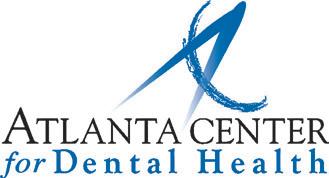
Brought to you by – Summit Counseling Center
If your child is struggling with defiant, aggressive, impulsive, irritable behaviors and can be especially difficult with obeying rules and respecting authority these may be signs of Oppositional Defiant Disorder (ODD) symptoms. Raising kids can be challenging but it can be even more of a challenge when setting structure for your child and they refuse to follow it. Listed below are suggestions to help parents if the behaviors listed above are present or if parents have received a diagnosis of ODD.
1. Try to separate their behavior from their identity. They are likely not engaging in the behavior intentionally, but it may be a response to some internal struggles they are experiencing.
2. Try not to compare your struggles to theirs. Adults have a stronger threshold because they have lived longer. In this case, do not compete against what they may be going through with what you have experienced or may be experiencing now. Listen and understand the challenges they may face so you can hear how things look and feel from their perspective. It is not about anyone being right or wrong. Healthy relationships require us to understand others’ struggles and viewpoints to support them in those areas. For example, if the child thinks no one listens to them, it would be helpful to carve out intentional time to let them speak without offering any comments but just letting them talk. This does not mean they were right or that anyone was wrong, but this is an identified area where we can provide support.
3. Remember the positives and try to speak about them as much
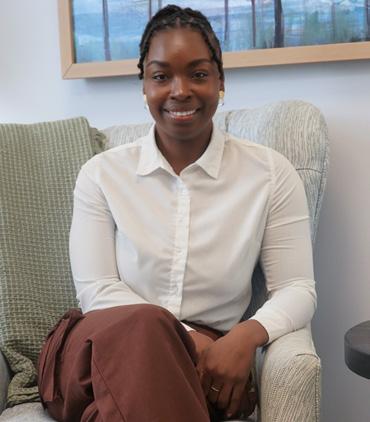
as possible. You may say things like “You are so amazing at articulating how you feel, and it helps me when you do that.” Avoid saying aggressive or negative things. You can still be assertive by saying “No” but avoid name-calling. Sometimes they may not want to get in trouble even though they know the behavior can lead to trouble. Impulsivity for negative behaviors is common for a variety of reasons, including control or attention.
4. Pick your battles. It could be helpful to create a discipline system that prevents you from having to engage in arguments. If they did not do the dishes and the consequence is there is no screen time for the night, you can avoid having to argue or go back and forth even if the child tries to disagree. Decide the rules (write them down) and be consistent with them. Try not to add or change anything. You can create a daily routine or checklist to earn rewards
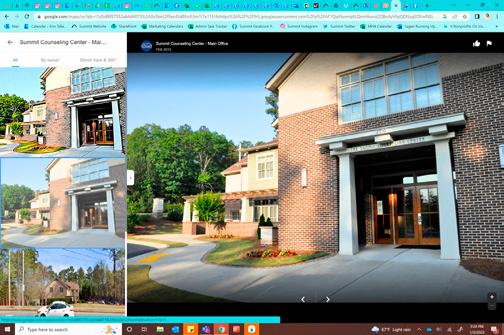


when items are completed.
5. Unfortunately, their struggles may be triggered by aggressive or negative talk and negative attention. Responding in these ways will only feed and continue the cycle. The idea is to break the cycle and create a healthier one.
These things are time-consuming. However, these steps are designed
to help parents maintain peace and create balance in the household. Rules are healthy for every child. Our goal is to learn how to implement them so the child can grasp and understand. Parents starting individual therapy can be helpful to have a safe space to practice self-care and confront personal emotions that could be arising.


As families in Roswell, Georgia prepare for another school year, there’s one important item that should be on every back-to-school checklist: a dental checkup. At Roswell Dental Care, we help students head back to class with clean, healthy smiles and the confidence that comes with them.
August is the ideal time to schedule routine care before calendars get crowded—and it’s also a smart way to catch small problems before they become big distractions during the school year.
Why preventive dental visits matter for kids
According to the Centers for Disease Control and Prevention (CDC), tooth decay is the most common chronic disease among children aged 6 to 19, affecting nearly 1 in 5 school-aged children. Left untreated, cavities can cause pain, infections, difficulty eating, and missed school days.
Regular cleanings and exams help prevent these problems and ensure your child is set up for a healthy year. At Roswell Dental Care, we check for:
• Cavities and early signs of decay
• Tooth development and eruption
• Gum health
• Enamel wear from grinding or acid exposure
• Proper oral hygiene habits
We also provide fluoride treatments and sealants—proven to reduce the risk of cavities in molars by up to 80%, according to the American Dental Association (ADA).
Make dental health a learning habit
Routine dental visits teach kids that oral health is part of their overall
wellness. We help make those lessons stick by showing kids how to brush and floss effectively, make smart snack choices, and understand the importance of daily care.
Need a little help with motivation? We make checkups fun and rewarding, and we’re happy to explain treatment in kid-friendly language.
What to pack (and what to avoid)
Back-to-school season is also a great time to rethink lunchbox habits. We recommend packing:
✔ Fruits and veggies
✔ Cheese and yogurt
✔ Water instead of juice or soda
Avoid sticky candies, gummy vitamins, and sports drinks that bathe teeth in sugar and acid. These can increase cavity risk, especially if children sip on them throughout the day.
Care for parents, too
While the kids are getting ready for school, don’t forget your own smile! We offer convenient appointments Monday through Thursday and select Fridays for:
• Routine cleanings and exams
• Teeth whitening and cosmetic touch-ups
• Botox® and filler treatments for facial rejuvenation and TMJ relief
Get your family’s dental care back on track now—before fall schedules fill up!
Healthy smiles start here—for students, parents, and everyone in between. Call Roswell Dental Care today to book your back-to-school appointments at 770-998-6736 or visit us at www.roswelldentalcare.com.




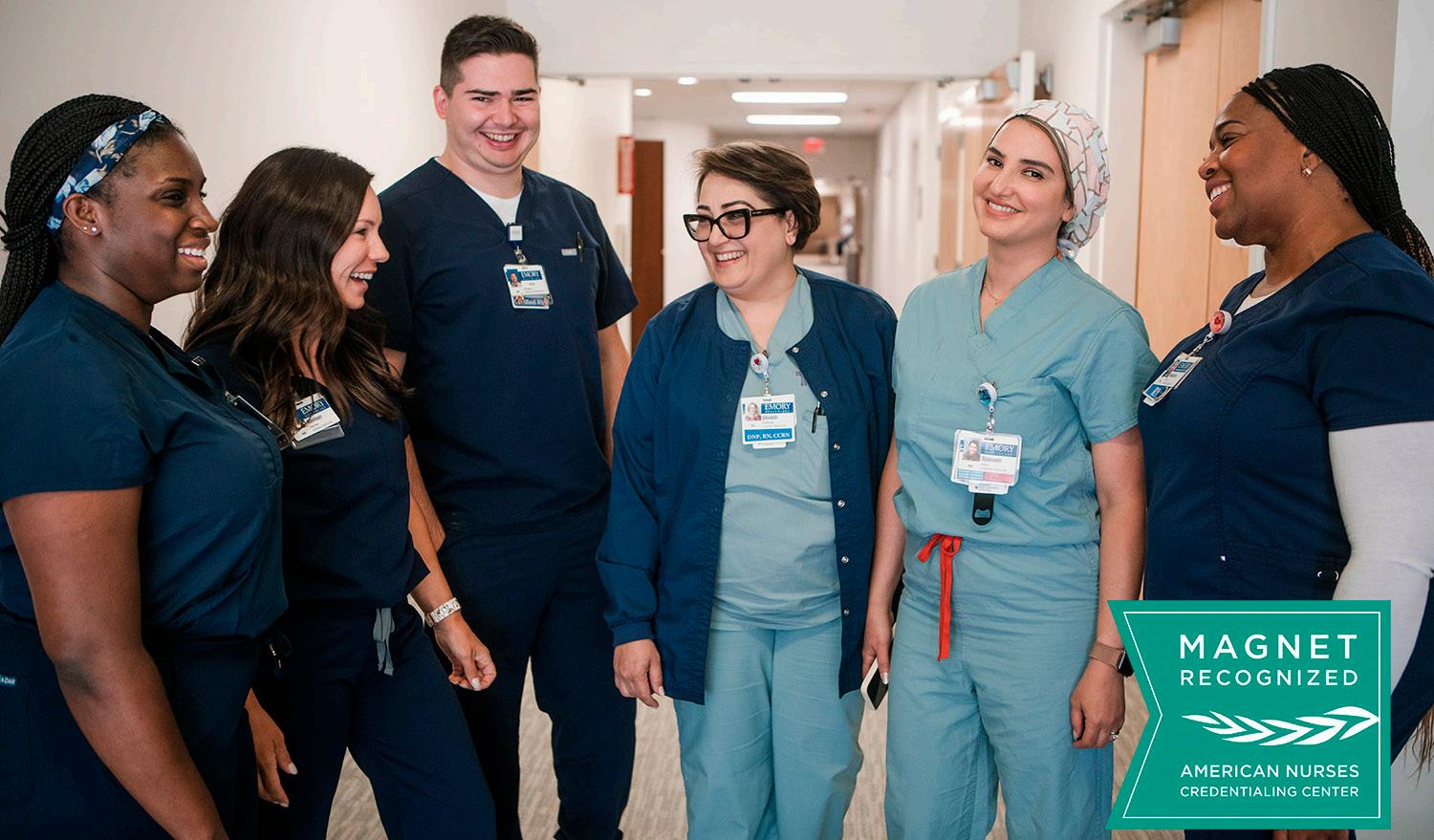
How Magnet® Designation makes a difference
Brought to you by - Emory Heart & Vascular
If you have a cardiac condition, you already know how important it is to find a specialist you can trust to care for you at every stage of your heart-health journey.
But your nursing team is also a vital part of your care, too. Whether you are visiting for a heart check-up, undergoing cardiac rehabilitation or having bypass surgery, nurses play a critical role in ensuring you receive high-quality care.
But how do you find excellent nurses? You can’t connect with them by searching the internet for “great nurses near me.” But you can look for a heart program that makes nursing excellence a high priority. An academic health system like Emory Healthcare is dedicated to achieving the gold standard for nursing excellence: Magnet designation.
The American Nurses Credentialing Center (ANCC) established the Magnet Recognition Program almost 30 years ago. Magnet designation is the ultimate nursing credential. It recognizes quality patient care, nursing excellence and innovations in professional nursing practice.
The application process is thorough and time-consuming. Many organizations strive for Magnet designation but never achieve it.
Earning Magnet designation is proof of a rock-solid commitment to excellent health care. Emory Healthcare is the only health system in Georgia with six Magnetdesignated hospitals and the state’s first and only Magnet-designated ambulatory practice, Emory Clinic.
Our six Magnet-designated hospitals include:
• Emory Johns Creek Hospital
• Emory Saint Joseph’s Hospital
• Emory University Hospital
• Emory University Hospital Midtown
• Emory University Orthopaedics & Spine Hospital
• Emory Decatur Hospital/Emory LongTerm Acute Care
Magnet designation is a significant professional accomplishment for all of our nurses. But more importantly, it reflects our nursing team’s sincere concern and compassion for every patient who entrusts their care to Emory Healthcare.
Magnet makes a difference in your heart care
Magnet designation tells you that Emory Healthcare creates an environment where nurses in every specialty can thrive. That’s certainly true in cardiac medicine. Throughout the health system, our heart nurses care for patients with expert knowledge and sensitivity, whether helping them manage a chronic condition like heart failure or coordinating their care before or after surgery. Our heart nurses:
• Work with physicians and other health professionals to provide high-quality patient care.
• Educate patients about their condition and treatment.
• Help design new care models.
• Lead quality improvement teams.
• Participate in cardiac research.
• Use the latest technology and patient care practices to help you heal.
Ready to transform your heart health?
If you need heart care, turn to experts at the top of their field. Emory Heart & Vascular brings together more than 150 physicians and 18 specialized programs in cardiology, cardiothoracic surgery and vascular surgery.
Next-day new patient cardiology appointments are available at one of our 23 locations.
Visit emoryhealthcare.org/transform to learn more and schedule an appointment.

Our expert heart & vascular team pioneers the most innovative techniques and treatments. Giving you more options and better outcomes than anywhere else. To make more “tickle monster!” moments like this possible.
The difference? Emory Women’s Center at Johns Creek uses research and innovation in health to provide exceptional care, close to home. From routine gynecology and menopause management, to high-risk pregnancies and specialty care, our team is here for your journey no matter where it takes you.
Visit emoryhealthcare.org/history to schedule an appointment.
Visit emoryhealthcare.org/women to schedule an appointment.

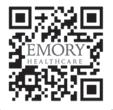
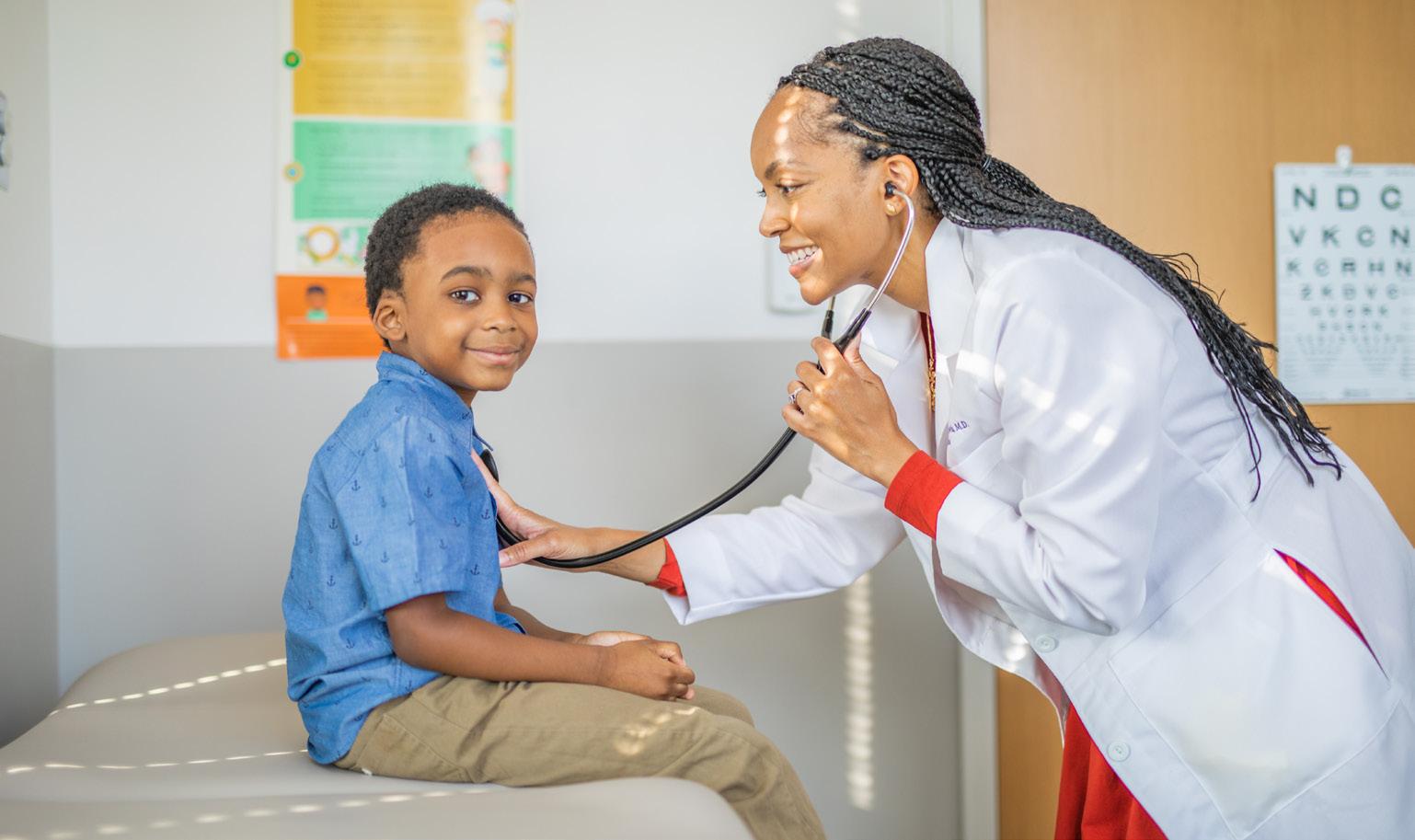
Brought to you by – Wellstar
As your family begins the new school year, help your child start off strong. Make sure their health is up to date by scheduling a checkup.
Before heading back to the classroom, prioritize your child’s physical and emotional well-being with a visit to your family’s Wellstar pediatrician. Our compassionate pediatricians share your goal of keeping children healthy as they grow.
“I believe in treating the whole child. What I mean by that is their physical health is very important, but I also feel that their emotional health is imperative,” said Wellstar Pediatrician Dr. Brandi Lewis. “My goal is for all my patients to be resilient, happy and healthy. My role is to work

LEWIS
with families to help accomplish that goal.”
Preventative check-ups and screenings help children stay ahead of health issues. Our pediatricians will ensure your child is up to date on their vaccines and discuss which immunizations are needed to prevent disease. Your family’s pediatrician can also help you navigate health requirements at your child’s school.
Heading back to school healthy
Teach your child healthy habits so they can feel their best throughout the school year.
• Practice good hygiene. Show children how to
wash their hands properly and remind them to do it frequently. Do not send your children to school if they are sick.
• Get moving. Children should have about 30 to 60 minutes of moderate activity every day. Staying active can be as simple as a fun family bike ride around the block, a game of tag in the yard or going for a walk in the park.
• Eat healthy. Teach children about good nutrition by encouraging them to eat a variety of fruits and vegetables and by limiting sugary drinks.
• Get plenty of sleep. Children ages 3 to 5 should get about 10 to 13 hours of sleep a day. Children 6 to 12 years old should get nine to 12 hours, and teenagers need about 8 to 10 hours.
While the end of summer is often a busy time, planning ahead now will help ensure the entire family has a healthy, successful year.
Find a Wellstar pediatrician near you at wellstar.org/kidcare.


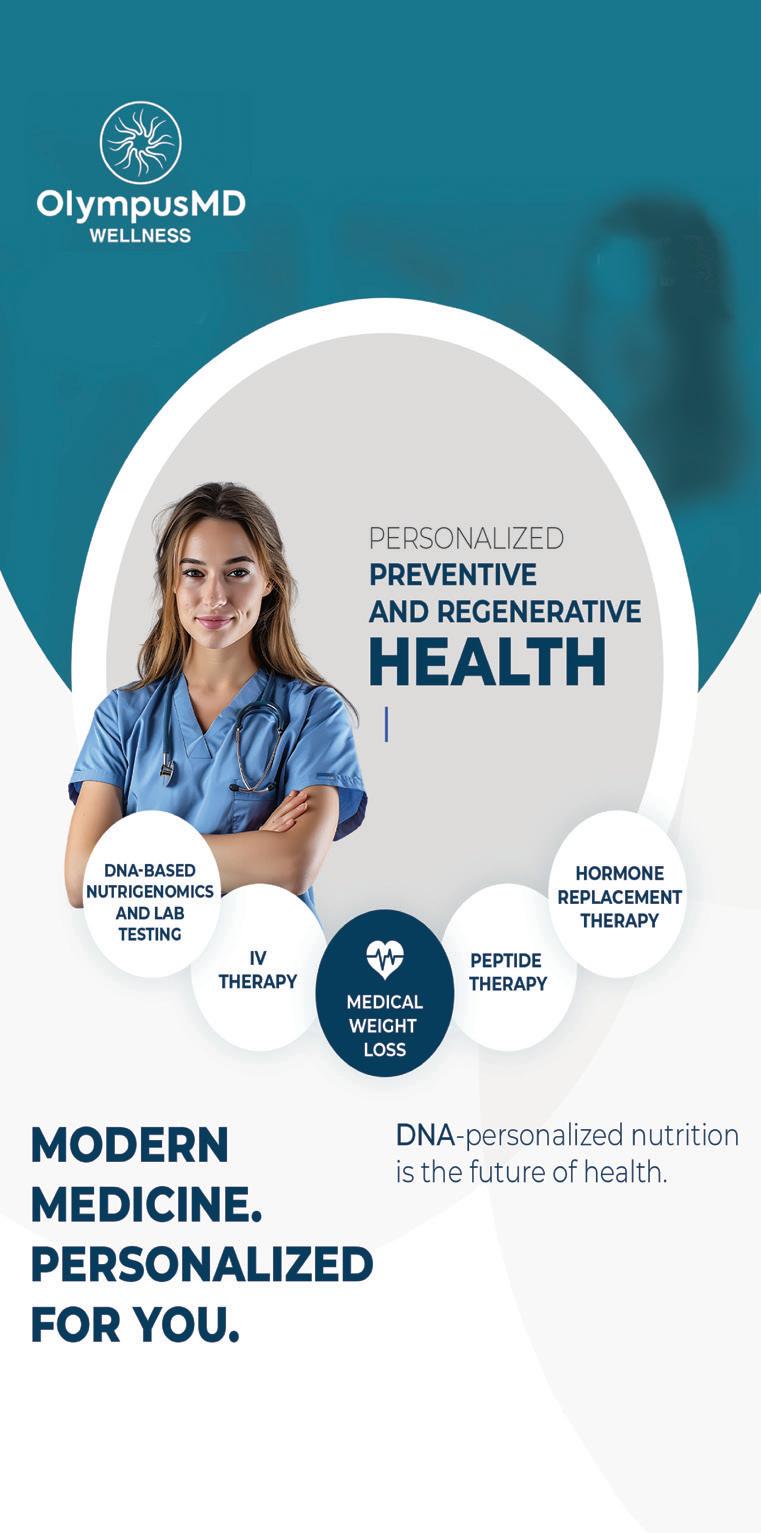
go far beyond the typical one-size-fits-all supplements.
Imagine walking into a clinic and receiving a health plan created not from averages or general guidelines—but from your own DNA. That’s the promise of DNA nutrigenomics , a rapidly growing field that combines genetic science with nutrition and medicine to create highly personalized wellness strategies.
Unlike traditional health plans that rely on trial and error, DNA nutrigenomics analyzes how your genes influence key processes like metabolism, inflammation, detoxification, and nutrient absorption. The results can inform customized recommendations for diet, exercise, supplementation, and even medical therapies.
One of the most exciting developments in this space is the ability to design custom nutraceutical formulas vitamins, minerals, and plant-based compounds tailored to your genetic needs. With over 400,000 possible ingredient combinations, these formulas
But the personalization doesn’t stop there. Some clinics are now using genetic insights to guide peptide therapy stacks, which can support muscle growth, cognitive performance, cellular repair, and longevity. In addition, DNA data can help optimize medical weight loss programs by identifying how an individual may respond to certain medications, diets, or fitness routines.
While this technology was once reserved for elite athletes and researchers, it's now becoming more accessible to everyday individuals who want to take control of their health with greater precision. Local providers are beginning to integrate these services into their wellness offerings, making it easier than ever to create a plan that's biologically aligned with your body.
As DNA testing becomes more affordable and science advances, the age of personalized wellness is quickly replacing guesswork with data—and changing the way we think about prevention, performance, and longevity.

Brought to you by - Dr. Kehinde Olumesi of Epiphany DermatologyBrookhaven
As skin matures, it undergoes various changes that necessitate regular skin checks to ensure overall skin health. Differentiating between age spots, healthy moles and potential skin cancers is crucial. Age spots, often appearing as flat, brown, or black spots on sun-exposed areas, are generally harmless but can be mistaken for more serious conditions. Early detection of skin cancer, including melanoma, basal cell carcinoma and squamous cell carcinoma, significantly increases the chances of successful treatment. Therefore, routine skin examinations are essential for mature skin to maintain health and catch any issues early.
Addressing skin conditions and rejuvenation procedures
Dermatologists can assist with a variety of skin conditions and rejuvenation procedures for mature skin. Common issues such as dryness, age-related pigmentation and conditions like rosacea, psoriasis and eczema, which can persist or develop with age, are also addressed with specialized care plans.
In addition to treating conditions, dermatologists offer rejuvenating procedures to enhance the appearance and health of mature skin. Treatments such as chemical peels, laser rejuvenation and injectable treatments like BOTOX® Cosmetic and dermal fillers can reduce the appearance of wrinkles, improve skin texture and promote collagen production. These procedures not only rejuvenate the skin but also boost confidence and overall well-being. Establishing a relationship with a dermatologist ensures that your skin receives comprehensive care tailored to its evolving needs, promoting longterm skin health and vitality.

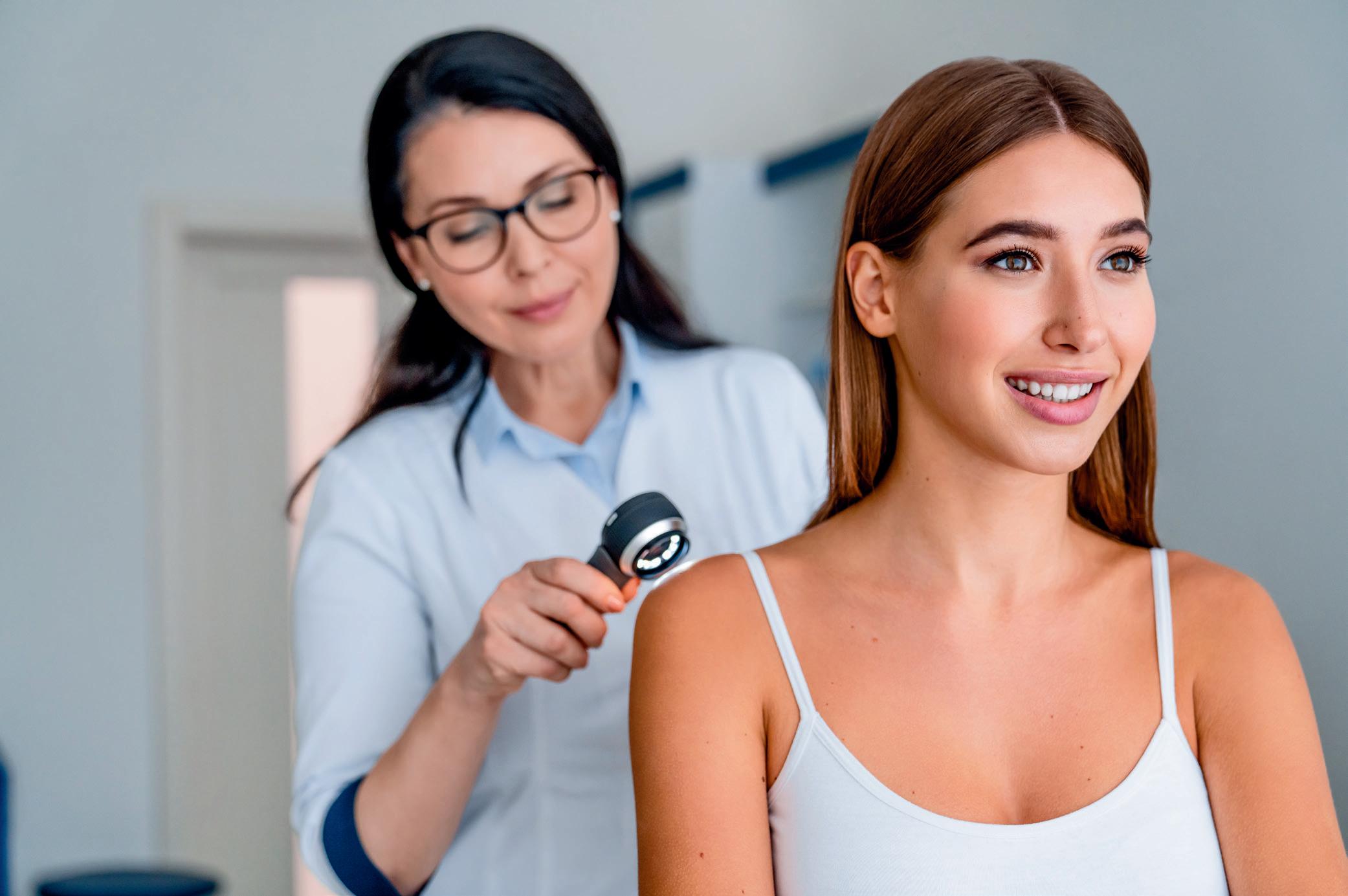



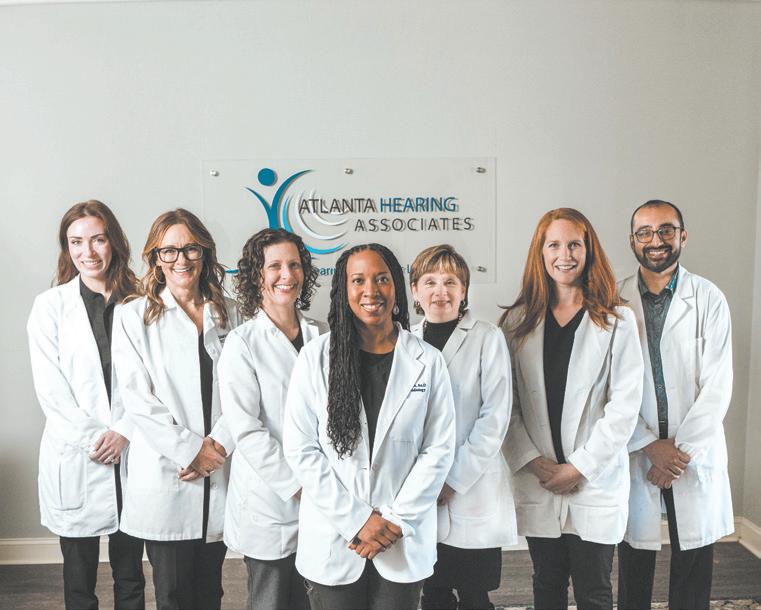




























Atlanta
Atlanta Hearing Associates is a large audiology practice that encompasses 5 different locations throughout Georgia. Our offices provide comprehensive hearing tests, tinnitus assessments, ear cleaning, and hearing devices for all ages.
Every doctor you will meet is focused on your needs as a patient and works with every manufacturer to provide
a personalized fitting. Each location utilizes state of the art technology and family-oriented care to help guide our patients to the best hearing devices and information on hearing healthcare.
We also partner with different agencies to provide audiological care to veterans, ATF officers, reservists, police departments, Cochlear implants recipients, and community wellness groups.
We accept all major insurances for patients who have a hearing healthcare benefit that they are eligible to use.
Our offices are located in Atlanta, Decatur, Dunwoody, Lake Oconee, and Milledgevile.











